Toni Morrison: Loving and 'Ruining' Books
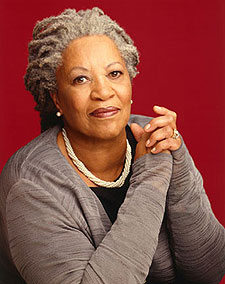 "What's really comforting for me, being here, is being among people where I don't have to defend books."
"What's really comforting for me, being here, is being among people where I don't have to defend books."
 "What's really comforting for me, being here, is being among people where I don't have to defend books."
"What's really comforting for me, being here, is being among people where I don't have to defend books."
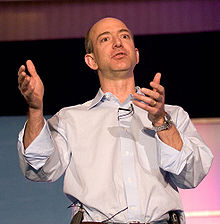 At a 10 a.m. press conference today, Amazon CEO Jeff Bezos will end all the speculation when he unveils, perhaps, the Kindle Fire Android tablet. Here's a brief roundup of some last-minute, often breathless, coverage:
At a 10 a.m. press conference today, Amazon CEO Jeff Bezos will end all the speculation when he unveils, perhaps, the Kindle Fire Android tablet. Here's a brief roundup of some last-minute, often breathless, coverage:
Calling Amazon's new tablet potentially the "first true media tablet," paidContent.org suggested six "areas to watch for in Amazon’s tablet product launch and what impact each will have on the market:
The Wall Street Journal reported that Amazon will benefit from the "built-in promotion" of millions of people already visiting its website. "Amazon has an advantage that other tablet manufacturers don't in that millions of people already visit its site on a regular basis," said Ken Sena, an analyst who covers Amazon for Evercore Partners.
If you are in a comparative shopping mood, Mashable examined "Amazon's Competition: The 10 Most Influential Tablets on the Market," noting that whether or not it turns out to be an iPad killer, the device "is sure to cause a stir. But is Amazon entering an already saturated market?"
And just for fun (or not), TechCrunch imagined, "The Future of Books: A Dystopian Timeline, predicting that 2015 will mark "the death of the Mom and Pops. Smaller bookstores will use the real estate to sell coffee and Wi-Fi. Collectable bookstores will still exist in the margins."
Chris Kerr of Parson Weems posted our favorite Facebook response to this forecast: "TechCrunch predicts demise of bookstores by 2018. My prediction: TechCrunch will be a footnote a lot sooner."

The Borders building may also be used as "a library service point, which could allow consolidation of Pioneer-provided library services such as the book box and book lockers currently available at Sooner Mall," the Oklahoman wrote.
"The system has been saving for an opportunity like this. The location, design and architectural features of the former bookstore are ideally suited to the needs of the library system," said Masters.
The Pioneer Library System's move is just one of many changes on the retail real estate map nationally since the demise of Borders Group. The New York Times reported that despite a number of former Borders locations being taken over by other booksellers (Books-a-Million, the Hudson Group, independents), "there is little doubt that many of the vacated Borders stores are simply too large--and have leases that are too expensive--to turn a profit by selling books.
"The problem with bookstores is that the margins are pretty small compared to other retailers," said Oren Teicher, American Booksellers Association CEO. "That’s why you don’t see lots of our members in big national malls. The rents just don’t make it work."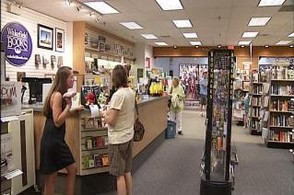 One exception to this rule occurred in Wakefield, R.I., where a former Waldenbooks is now Wakefield Books, an indie that was born "courtesy of an unusual partnership" among Wakefield Mall, owner Jeff Levy; Susan Novotny, owner of the Book House Albany, N.Y.; and David Didriksen, owner of Willow Books, Acton, Mass.
One exception to this rule occurred in Wakefield, R.I., where a former Waldenbooks is now Wakefield Books, an indie that was born "courtesy of an unusual partnership" among Wakefield Mall, owner Jeff Levy; Susan Novotny, owner of the Book House Albany, N.Y.; and David Didriksen, owner of Willow Books, Acton, Mass.
Vanderbilt University in Nashville, Tenn. is moving its bookstore to a 27,000 square-foot former Borders. "Our number one priority is course materials and serving the Vanderbilt campus," said Frank Gladu, assistant vice chancellor for business services. "But we will also be able to serve the community in a much better way."
The Times also noted that the Hudson Group has taken over at least nine former Borders stores at airports in Las Vegas, Baltimore, Newark, Boston, Washington Dulles and Raleigh-Durham. The company is interested in other locations, according to Sara Hinckley, v-p for book buying and promotions. "Most of the Borders leases had relatively short terms left on them," she said.
Wakefield Books photo: NBC 10 News
 A new partnership between online self-publisher Lulu.com and Barnes & Noble is designed to help writers publish and distribute their works to owners of Nook e-reading devices.
A new partnership between online self-publisher Lulu.com and Barnes & Noble is designed to help writers publish and distribute their works to owners of Nook e-reading devices.
Bob Young, founder and CEO of Lulu, called the deal "another step in our passionate effort to help Lulu creators reach more readers and sell more books."
"We are excited to partner with Lulu.com to bring its catalog of fantastic e-books to our rapidly growing community of millions of Nook owners and readers," said Jim Hilt, v-p of e-books at B&N, adding that the company is committed "to bring readers new and unique e-books by great authors that can be found with partners like Lulu.com."
 Kobo has released more details about its Kobo Pulse technology, which will be part of the Reading Life platform and is described as "a fully social in-book e-reading experience." Kobo Pulse is designed to show "the intensity of social engagement throughout a book, becoming larger and brighter, inviting the user to engage with other readers," according to the company.
Kobo has released more details about its Kobo Pulse technology, which will be part of the Reading Life platform and is described as "a fully social in-book e-reading experience." Kobo Pulse is designed to show "the intensity of social engagement throughout a book, becoming larger and brighter, inviting the user to engage with other readers," according to the company.
Kobo CEO Michael Serbinis spoke last Friday at F8, Facebook’s developers conference, about the integration of Kobo Reading Life with Facebook. The company said these features will "roll out gradually over the coming months."
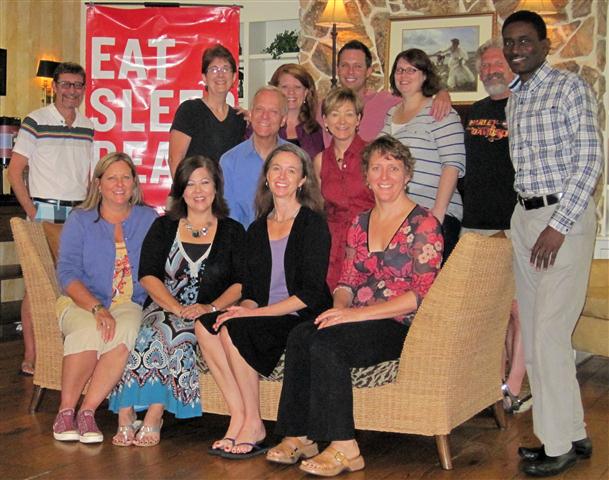
From coast to coast and as far away as Lagos, Nigeria, new and prospective booksellers gathered on Amelia Island, Fla., earlier this month to learn the best practices of retail bookselling at the full-week workshop, Owning A Bookstore: The Business Essentials, run by the Bookstore Training Group of Paz & Associates and co-sponsored by the American Booksellers Association. Trainers included new and veteran booksellers, a lease negotiator, a store designer and a representative from the Small Business Administration. Attendees included front (from l.): Brenda Beal, Tina Ferguson, Holly Weinkauf, Amy Sullivan; middle: Mark Kaufman and Donna Paz Kaufman; and back: Dan Iddings, Serena Wyckoff, Wendy Lenz, Jordan McAuley, Nancy Gupton, Dan Tribby, Olubunmi Onafowokan.
Photo: Marsha Wood
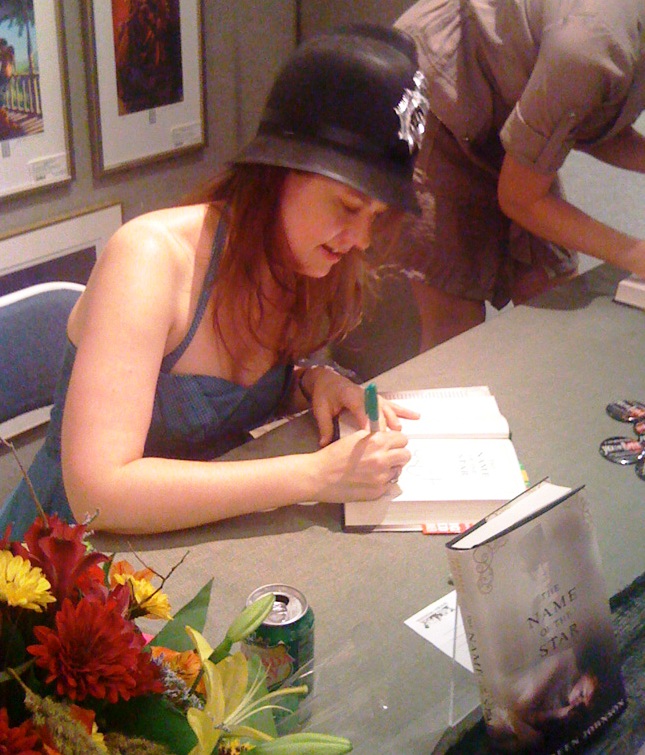 "Thank you for coming tonight," Maureen Johnson told the crowd of teenage girls who crowded the back of Manhattan's Books of Wonder to celebrate the publication of her latest YA novel, The Name of the Star (Putnam). "I'm a little bit shocked, and frightened, and cornered." During her brief, freeform remarks, Johnson explained how she came up with the story, about a American teenage girl studying in London's Whitechapel district while a ghostly killer re-creates the murders committed by Jack the Ripper, during a boring ghost tour of the city where the spirits described seemed capable of little more than making rooms chilly. The ghost of Jack the Ripper, she figured, would be much more awful, and she immediately plunged into six weeks of research into his history--"which, honestly, makes you creepy."
"Thank you for coming tonight," Maureen Johnson told the crowd of teenage girls who crowded the back of Manhattan's Books of Wonder to celebrate the publication of her latest YA novel, The Name of the Star (Putnam). "I'm a little bit shocked, and frightened, and cornered." During her brief, freeform remarks, Johnson explained how she came up with the story, about a American teenage girl studying in London's Whitechapel district while a ghostly killer re-creates the murders committed by Jack the Ripper, during a boring ghost tour of the city where the spirits described seemed capable of little more than making rooms chilly. The ghost of Jack the Ripper, she figured, would be much more awful, and she immediately plunged into six weeks of research into his history--"which, honestly, makes you creepy."
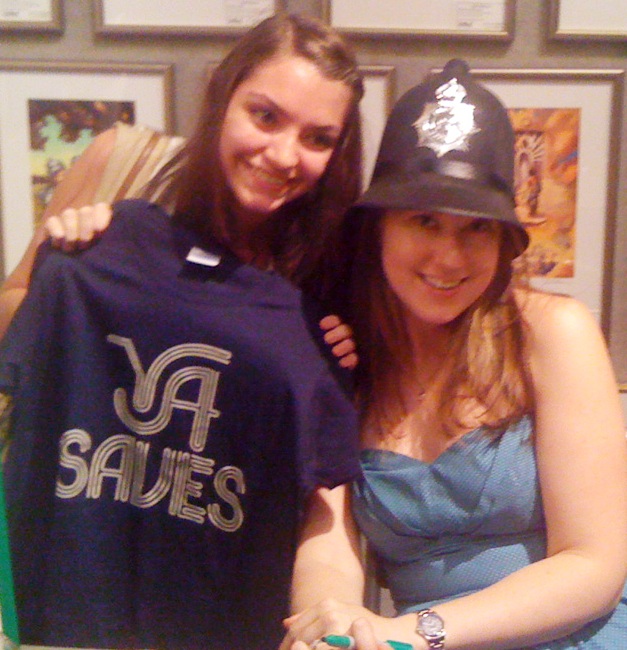 Johnson quickly opened up the floor: "Are you only doing four questions?" asked the first audience member, referencing the author's daily ritual with her Twitter followers. Another fan wanted to know if there would be a third book in Johnson's Suite Scarlett series; she'd just started writing it, though it was on hold during the current book tour. "I know what happens," Johnson confided. "That makes one of us!" She also brought along several "YA SAVES" T-shirts, referencing the passionate online fight she helped lead earlier this year against a Wall Street Journal column attacking the supposed degenerate tone of contemporary young adult fiction. The shirts are being sold online to raise money for Reading Is Fundamental, but Johnson tossed this evening's batch to fans who correctly answered trivia questions. And some not-so-trivial: "Can anybody tell me if Robin Wasserman is here?" Johnson asked, setting up a question about a fellow YA author in the audience; the fan who pointed her out received a shirt as a reward.
Johnson quickly opened up the floor: "Are you only doing four questions?" asked the first audience member, referencing the author's daily ritual with her Twitter followers. Another fan wanted to know if there would be a third book in Johnson's Suite Scarlett series; she'd just started writing it, though it was on hold during the current book tour. "I know what happens," Johnson confided. "That makes one of us!" She also brought along several "YA SAVES" T-shirts, referencing the passionate online fight she helped lead earlier this year against a Wall Street Journal column attacking the supposed degenerate tone of contemporary young adult fiction. The shirts are being sold online to raise money for Reading Is Fundamental, but Johnson tossed this evening's batch to fans who correctly answered trivia questions. And some not-so-trivial: "Can anybody tell me if Robin Wasserman is here?" Johnson asked, setting up a question about a fellow YA author in the audience; the fan who pointed her out received a shirt as a reward.
Finally, asked for "the tip to end all tips," Johnson offered this bit of writing advice: "If you want to write, read a lot, then write a lot. Write all the time... and never, ever worry if you're bad. I'm bad every day. My first drafts are some rough road. You just have to not be afraid of sucking."--Ron Hogan
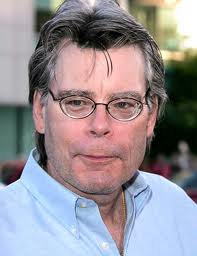 Last week, Stephen King treated an audience at George Mason University to a chapter from his work-in-progress, a sequel to The Shining, which has the working title Dr. Sleep. The Guardian showcased a video io9 had featured, and reported the novelist "revealed that it would see Danny dealing with 'a gang of wandering psychic vampires who feed on people's energy.' "
Last week, Stephen King treated an audience at George Mason University to a chapter from his work-in-progress, a sequel to The Shining, which has the working title Dr. Sleep. The Guardian showcased a video io9 had featured, and reported the novelist "revealed that it would see Danny dealing with 'a gang of wandering psychic vampires who feed on people's energy.' "
"They don't like dogs and dogs don't like them," King read. "You might say dogs see through them--to the sharp and watchful eyes behind the cut-rate sunglasses, to the strong and long muscled hunters' legs beneath the polyester slacks from Wal-Mart, to the sharp teeth beneath the dentures waiting to come out. They don't like dogs, but they like sick children. Yes, they like sick children very much."
Bent Object of My Affection: Twists and Turns of Love by Terry Border (Running Press), a followup to Bent Objects that features 60 wirey creations with the theme of love.
Effective October 17, Tina McIntyre is being promoted to executive director, digital business development and operations, at Little, Brown Books for Young Readers. She is currently director of marketing and began her publishing career in online marketing at Scholastic and as marketing manager for paperbacks and online. In 2004, she joined Little, Brown Books for Young Readers as senior marketing manager and was later promoted to associate director of marketing.
---
Hector Sierra has been promoted to general manager and senior v-p for National Geographic's Books Publishing Group. He was formerly COO for the division. Before joining National Geographic in 2000, he worked at Simon and Schuster and John Wiley & Sons.
Tomorrow on KCRW's Bookworm: Héctor Tobar, author of The Barbarian Nurseries (Farrar, Straus & Giroux, $27, 9780374108991). As the show put it: "Araceli Ramirez, the heroine of Héctor Tobar's new novel, The Barbarian Nurseries, is a nanny who finds herself accused of kidnapping her charges, when she is, in fact, taking them to their grandfather. This conversation centers on the way our concept of racialism enables us to make explosive incidents out of what are really good intentions gone wrong."
---
Tomorrow on NPR's Diane Rehm Show: John Lithgow, author of Drama: An Actor's Education (Harper, $26.99, 9780061734977).
---
Tomorrow on NPR's Talk of the Nation: Brooke Hauser, author of The New Kids: Big Dreams and Brave Journeys at a High School for Immigrant Teens (Free Press, $26, 9781439163283).
Jacqueline Susann’s 1966 novel Valley of the Dolls "is getting a series treatment by Oscar-nominated Precious director Lee Daniels," Deadline.com reported. NBC has bought the project from 20th Century Fox TV and Chernin Entertainment. Daniels will write and direct the TV series version, "which will be based on the 1967 Valley of the Dolls feature adaptation." In addition to the original film, the novel, which has sold more than 30 million copies, was also adapted as a mini-series in 1981 and a late-night soap opera in 1994.
Word & Film featured its selections for the "5 best banned books turned films":
The Biographers' Club announced its shortlist for the £5,000 (US$7,759) H.W. Fisher Best First Biography Prize. The winner will be announced October 25 in London. This year's finalists are:
Mysterious Wisdom: The Life and Work of Samuel Palmer by Rachel Campbell-Johnston
The Children of Lovers: A Memoir of William Golding by His Daughter by Judy Golding
William Armstrong: Magician of the North by Henrietta Heald
Now All Roads Lead to France: The Last Years of Edward Thomas by Matthew Hollis
Andrew Marvell: The Chameleon by Nigel Smith
Catherine of Aragon: Henry's Spanish Queen by Giles Tremlett
 Syrian poet Adonis "has emerged as the frontrunner to be crowned Nobel literature laureate next month," the Guardian reported. The 81-year-old Goethe prize winner (Shelf Awareness, September 1, 2011), who was called "the most important Arab poet of our time" by the Goethe jury, is the 4-1 favorite to win this year's Nobel prize for literature, which will be announced in October. Ladbrokes lists him just ahead of 80-year-old Swedish poet Tomas Tranströmer (9-2), who was the betting choice last year, when the honor went to Mario Vargas Llosa.
Syrian poet Adonis "has emerged as the frontrunner to be crowned Nobel literature laureate next month," the Guardian reported. The 81-year-old Goethe prize winner (Shelf Awareness, September 1, 2011), who was called "the most important Arab poet of our time" by the Goethe jury, is the 4-1 favorite to win this year's Nobel prize for literature, which will be announced in October. Ladbrokes lists him just ahead of 80-year-old Swedish poet Tomas Tranströmer (9-2), who was the betting choice last year, when the honor went to Mario Vargas Llosa. 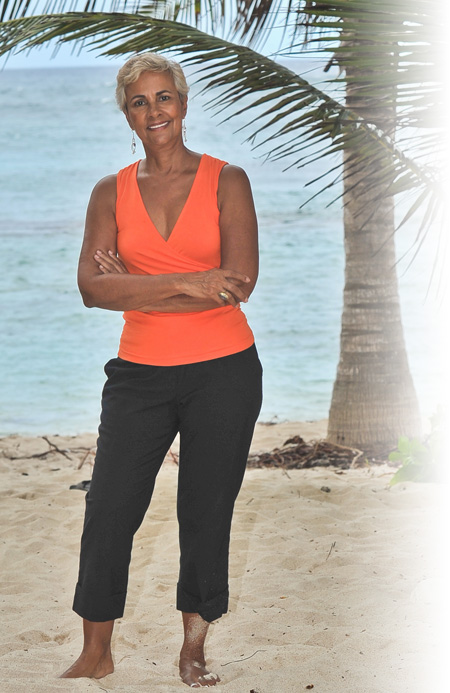 Gillian Royes was born in Jamaica, gained a scholarship to the Colorado College and moved to the U.S. in 1966. Three degrees later, she began editing, writing and lecturing in Atlanta. In addition to running a craft distributing company, she published her first book, Business Is Good, a history of Trinidadian business. This was followed by Sexcess: The New Gender Rules at Work.
Gillian Royes was born in Jamaica, gained a scholarship to the Colorado College and moved to the U.S. in 1966. Three degrees later, she began editing, writing and lecturing in Atlanta. In addition to running a craft distributing company, she published her first book, Business Is Good, a history of Trinidadian business. This was followed by Sexcess: The New Gender Rules at Work.
Royes's debut novel, The Goat Woman of Largo Bay (Atria, September 27, 2011), is the first of a planned 10-book series featuring amateur detective Shadrack Myers, who tends a cliffside bar in Largo Bay, Jamaica.
On your nightstand now:
Isabel Allende's Island Beneath the Sea; Terry McMillan's Getting to Happy; Kathryn Stockett's The Help; Lorene Cary's If Sons, Then Heirs. I tend to skip around between books, but these four are keeping me happy.
Favorite book when you were a child:
Louisa May Alcott's Little Women. Although it featured women who had little in common with me, I had a good imagination and could picture myself living in that two-story house in Massachusetts with the March sisters--maybe because I lived in a similar house with two sisters. I later visited that house and saw that it was almost exactly as I had imagined it! That says something about Alcott's power of description, even for a little West Indian girl.
Your top five authors:
Isabel Allende, Agatha Christie, Alexander McCall Smith, Jodi Picoult, V.S. Naipaul. As varied as the genres are, they seem to satisfy different parts of me.
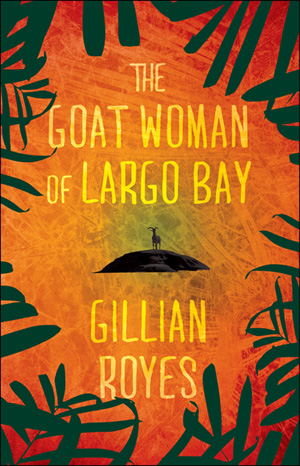 Book you've faked reading:
Book you've faked reading:
Elizabeth Gilbert's Eat, Pray, Love. It sounded too self-conscious to me, but everyone around me seemed to love it so I had it on my nightstand for a while--and then gave it away.
Book you're an evangelist for:
Rhonda Byrne's The Secret. It's helped me to learn the process of visualizing success: success in writing, success in publishing, success in relationships. I even include the philosophy in my second book!
Book you bought for the cover:
An interesting question, but I can't think of any. I'm probably too stingy to buy only for a cover! I always investigate a book over a cup of tea before buying.
Book that changed your life:
Ageless Body, Timeless Mind by Deepak Chopra. He introduced me to the idea that I could decide the age I'd be when I died and I could live longer than the statistics gave me. I've set my final birthday at 104--at least!
Favorite line from a book:
"Happy families are all alike; unhappy families are unhappy in their own way." --Leo Tolstoy, Anna Karenina.
Since almost every family is dysfunctional, this quote makes us all feel special, doesn't it?
Book you most want to read again for the first time:
Sir Arthur Conan Doyle's The Hound of the Baskervilles.
It was a long time ago now, and I'd love to feel that deliciously eerie again.
Why you started writing fiction:
I got bored with nonfiction, which I've written and edited for decades. I tend to like variety and challenges in everything, and one of the biggest challenges I could think of was learning to write fiction. Short stories don't hold me long enough, poetry frustrates me. Fiction it is-- and what joy! What torture!
Why you started a new career in your 60s:
Why not? If I'm going to live to 104, I've got to do something for the next 40 years, and I may as well have fun doing it.
Paul Thurlby's Alphabet by Paul Thurlby (Templar/Candlewick, $16.99 hardcover, 64p., ages 3-up, 9780763655655, October 10, 2011)
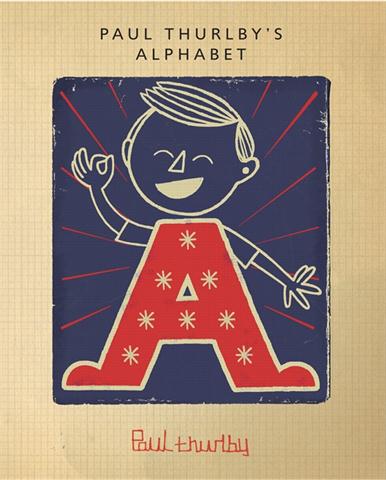 In his first picture book, Paul Thurlby makes the most of palette, type and composition.
In his first picture book, Paul Thurlby makes the most of palette, type and composition.
The British graphic designer builds his compositions on the capital letter that correlates to his subject on the right-hand page. Opposite, the left-hand page displays both the capital and lower-case letter against a bold, solid-colored backdrop--ideal for children just learning the alphabet. But those who have mastered their ABCs will most appreciate these witty illustrations. "Q for Quicksand," for instance, stars a red egg-shaped fellow with arms outstretched in fear, and one leg already submerged--for a perfect Q shape. "A for Awesome," which creates a portrait of the energetic boy on the book's cover, uses red, turquoise and navy on a sand-colored background. Two balls fill the centers of the capital "B" for "Bounce," in a composition of red, beige and navy with a slightly less green shade of light blue. Next, in front of a mesh net, only the goalie's arms form the "C" to "Catch" the soccer ball. Here, Thurlby incorporates the light blue that dominated the "B" spread, and introduces a gold background hue (for the left-hand page) that also colors the bone for the "D for Dog" spread. The artist carefully plans his palette to subtly carry his color scheme through the compositions, and precisely placed lines create a sense of movement.
Thurlby offers a variety of visual approaches. "G 4 Graffiti" breaks with the usual pattern ("4" in lieu of "for"), and the artist also leaves a message on the brick wall backdrop ("Paul woz ere"). He forms the type for "K is for Karate" (a boy's K-shaped karate stance) with the swish of a brushstroke that resembles Chinese calligraphy. At times, he plays with texture. The capital "I" itself forms an "Island," and crinkled paper suggests waves. Children may pick up this whimsical volume to learn their letters, but they'll also come away with a heightened aesthetic sense.--Jennifer M. Brown